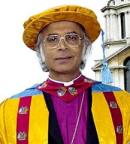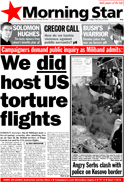Britain’s refusal of visa to cleric sparks anger in Muslim world
BBC Monitoring, 20 February 2008
By Mohamed Shokry
The British government has recently refused an entry visa to prominent Muslim cleric Yusuf al-Qaradawi on the grounds that he justifies terrorism. The decision, announced on 7 February, has drawn angry reactions from the Muslim world.
Egyptian-born, Qatar-based Al-Qaradawi is widely seen in the Muslim world as a symbol of moderation and advocate of inter-faith dialogue. He is the head of the International Union of Muslim Scholars. Al-Qaradawi visited the UK in 2004 and received a warm welcome from the mayor of London, Ken Livingstone.
The visa refusal decision has been widely viewed by Muslims as motivated by influential lobby groups in Britain.
Decision to widen “gap” between Muslims, British people
Al-Qaradawi, who condemned the 11 September 2001 attacks on the USA, has nevertheless always described attacks carried out by Palestinians as “martyrdom operations”. Al-Qaradawi is banned from entering the USA.
“Britain does not tolerate the presence of a person like Al-Qaradawi on its soil. This is because of his extremist ideas and support of terrorist acts. His presence will cause divisions within society,” a British Home Office spokesman told the pan-Arab London-based daily Al-Sharq al-Awsat.
Some Muslim scholars have warned the British government that the decision may have a bad impact on the relations between Muslims and British people.
“The government should go back on its decision because this harms British interests and Muslims’ feelings. It will widen the gap between us and the British people,” Dr Azzam al-Tamimi, the head of the Institute of Islamic Political Thought, told the Qatar-based pan-Arab TV Al-Jazeera’s “Behind the News” programme on 7 February.
“I am afraid this decision will send the wrong message to Muslims across the world on the British society and its culture,” Muhammad Abd-al-Bari, chief of the Muslim Council of Britain, commented following the decision.
Continue reading →


 The Rt Rev Michael Nazir-Ali, who received death threats for airing his views on Islamic issues, has vowed that he will continue to speak out.
The Rt Rev Michael Nazir-Ali, who received death threats for airing his views on Islamic issues, has vowed that he will continue to speak out.
 Britain did host US torture flights
Britain did host US torture flights